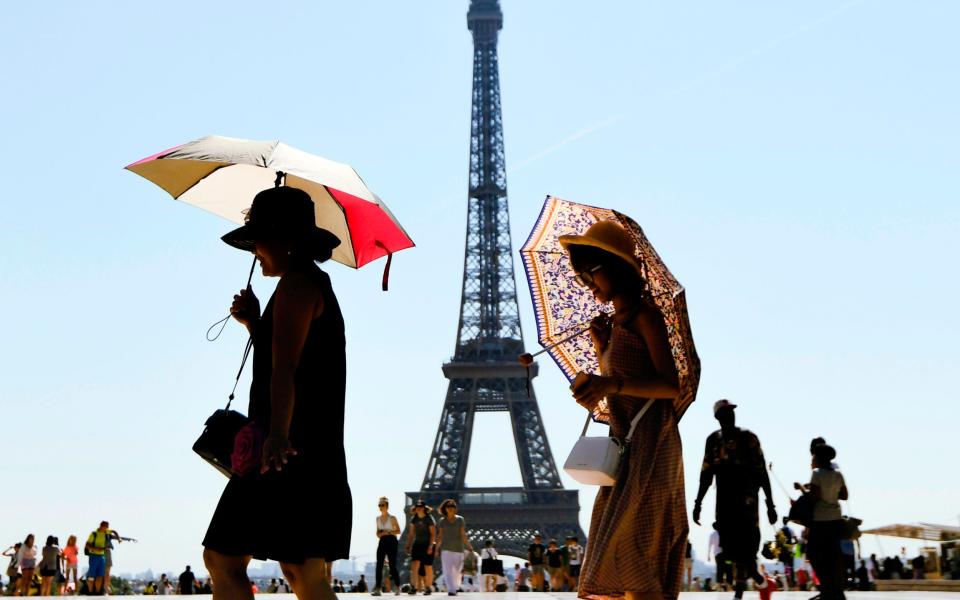All of the destinations that you’ll have to pay extra to visit in 2024

“Overtourism” is something of a buzzword already this year. We were beckoned back to seaside resorts and old favourites in the aftermath of the pandemic, before being assailed with stories of crowded restaurants and attractions. In Amsterdam, a new directive asked hedonistic Britons to stay away. In places like Athens, anti-tourist graffiti campaigns are being waged by locals, with the aim of letting visitors know they are unwelcome.
For other countries, tourist taxes are being implemented in response. Typically only small amounts of money, the fees are usually added onto hotel bills or payable at the airport.
What is a tourist tax?
A tourist tax is typically implemented by a country or municipality in order to support the tourism industry. In most cases, the amount paid is very small, and is put towards infrastructure projects or sustainability initiatives. Rarer are instances like that in Venice, where the tax is, essentially, an entrance fee, designed to monitor visitor numbers and tackle overcrowding.
Which countries will have a tourist tax in 2024?
Europe
Amsterdam, The Netherlands
The Netherlands has a well-established tourist tax policy, and Amsterdam has a well-established problem with certain types of tourist.
This year, the city’s toeristenbelasting, or tourist tax, will increase from 7 per cent of the cost of a hotel room to 12.5 per cent – applying to cruise passengers and overnight visitors alike. This makes it the highest of its kind in Europe. Plan a trip to Amsterdam with our expert guide.
Austria
The tourism levy in Austria depends on the province a traveller is visiting. In Vienna, for example, it typically amounts to just over 3 per cent of an accommodation bill.
Barcelona, Spain
Visitors to Barcelona have had to pay both a city-wide and regional tax since 2012. Last year, the municipal fee increased to €2.75 (£2.37); from April 1 of this year, the tax has risen to €3.25 (£2.80).
Tourists pay the fee as part of their accommodation bill. The proceeds are used to fund city infrastructure like bus routes and roadworks. Plan a trip to Barcelona with our expert guide.

Belgium
Tourist taxes vary between cities in Belgium, but they typically cost between €3 (£2.58) and €6 (£5.16).
Bulgaria
Those staying in Bulgarian holiday resorts should expect a small additional fee, typically €2 (£1.72) per person.
Budapest, Hungary
People staying in the Hungarian capital are charged an additional 4 per cent fee, per night, to their hotel bill. Plan a trip to Budapest with our expert guide.
Croatia
Visitors can expect to pay an additional 10 kuna (£1.10) per person per night.
Germany
Germany’s tourist taxes vary between cities. In Berlin, the amount equates to around 5 per cent of the total accommodation bill.
Greece
Greece has introduced a new “climate crisis resilience fee” for tourists this year, replacing the previous hotel tax. According to the Greek government, charges will range from €1.50 (£1.30) to €10 (£8.60), depending on accommodation, quality and the time of year. In the low season, the fee is capped at €4 (£3.45).
It comes after a year of record rainfall and heatwaves, which destroyed over 1,500 square kilometres of land and led to 37 deaths.
Iceland
During the pandemic, Iceland suspended its tourism taxes. They returned on January 1 2024, with hotels and guesthouses charging ISK 600 (£3.46), campsites ISK 300 (£1.73) and cruise ships stopping in Iceland’s ports ISK 1,000 (£5.76).

It comes after a remarkable year of inbound tourism in the country. There were nearly 800,000 international visitors last summer – up around a quarter from the same period in 2022, according to the Iceland Review. The European Travel Commission reports that both the number of nights stayed, and the number of arrivals, were higher last year than in 2019.
Italy
Taxes are set by individual municipalities in Italy. Generally, in cities like Rome, the amount varies from €2 (£1.72) to €5 (£3.90) per day, per person. Children, disabled travellers and their carers and patients admitted to health facilities are usually exempt. Plan a trip to Rome with our expert guide.
Menorca
Menorca, Majorca, Formentera and Ibiza have been subject to a tourist tax since 2016. Often called a Sustainable Tourism Tax, the Balearic government introduced the measure to maintain infrastructure across the islands. It varies depending on time of year, type of accommodation, age of travellers and more, but expect to pay around €2 (£1.72) per person, per day.
Olhão, Portugal
Olhão, a Portuguese fishing town, has started charging a tourist tax of €2 (£1.72) a night between April and October. This is halved in the off-season and does not apply to children under the age of 16. The charge is also capped at five nights, meaning a visitor can only be charged an additional €10 (£8.60) per trip.
Paris, France
Tourists have long been charged a taxe de séjour in France, with the price varying between cities. In anticipation of the Paris Olympics, however, fees will be increasing by around 200 per cent in the French capital.

Depending on the type of accommodation, visitors staying in hotel rooms in Paris can expect to pay a fee ranging from 75 cents (65 pence) to €15 (£12.90) per night. This is in addition to reported increases in the price of metro fares, museum tickets and hotel room rates. Plan a trip to Paris with our expert guide.
Prague, Czech Republic
In Prague, the tourist tax typically costs around 50 Czech Koruna per night, or £1.74. Plan a trip to Prague with our expert guide.
Slovenia
Like many tourist taxes, Slovenia’s varies between regions. Expect a higher rate – around €3 (£2.60) – in popular destinations like Ljubljana and Bled.
Switzerland
Depending on the region and accommodation quality, Switzerland’s tourist taxes are usually between CHF 2 (£1.84) to CHF 7 (£6.43) per person, per night.
Valencia, Spain
Another Spanish tourist tax, this time in Valencia. Again, it will apply to visitors staying in official accommodation, including campsites, hotels and self-catering properties. The style of accommodation will impact the amount paid, which varies from 50 cents (43 pence) to €2 (£1.72).
It isn’t clear when the tax, known as the Valencian Tax on Tourist Stays (IVET), will come fully into force – officials have been trailing its implementation since late 2022. Once it is introduced, however, the proceeds will be used to provide more affordable housing for locals living in tourist areas.
Venice, Italy
A tourist tax has long been proposed as a solution to Venice’s overcrowding problem. This year, its entry fee system is finally being implemented. A trial will launch between April and mid-July, where on certain days – mostly weekends – visitors will have to pay €5 (£4.30) to access the city. This only applies from 8:30am to 4pm, meaning that those visiting the city in the evening will be exempt. Those staying overnight will also bypass the charge.
Few expect visitor numbers to go down. Instead, proceeds from the fee will be earmarked for maintenance projects in the city, plus “the quality of the tourist offer (services, events, museums etc.)”. Plan a trip to Venice with our expert guide.

United Kingdom
Manchester, UK
The city of Manchester introduced a tourist tax in 2023 – the first in the UK to do so. Some £2.8 million has been raised in the first year, with the proceeds put towards “street cleaning and marketing”, according to a spokesperson. The current charge is £1 per night, per room. Plan a trip to Manchester with our expert guide.
Middle East
UAE
In Abu Dhabi, hotels typically impose a tourism fee of 6 per cent on guests’ hotel bills, in addition to a fixed fee of AED 15 (£3.20) per room, per night. In Dubai and Ras Al Khaimah, the price varies on the quality of accommodation: fees range from AED 7 (£1.50) to AED 20 (£4.30) per night.
North America
USA
Tourist taxes are not federally legislated in the US; states and regions have the ability to charge varying fees. In San Francisco, for example, the hotel tax rate is 16.25 per cent, which includes a 14 per cent “transient occupancy tax” and a 2.25 per cent “tourism improvement” fee.
The Caribbean
Caribbean islands
Taxes vary across Caribbean islands, with some charging upon departure, as an addition to the hotel bill, or both. Typically, tourist taxes average between 8 per cent (Grenada, St Lucia) and 15 per cent (Jamaica). Arrival and departure taxes also differ across the region, with the Bahamas charging $15 (£11.78), Jamaica charging $35 (£27.50) and Bermuda $50 (£39).

Central America
Quintana Roo, Mexico
The state of Quintana Roo in Mexico – home to tourist-favourites like Cancun and Cozumel – introduced VisiTAX in 2020. Payable online, the charge of $20.99 (£16.60) is applicable to all international visitors.
Oceania
New Zealand
Most international visitors (excluding those from Australia) must pay a $35 (£17) levy to enter New Zealand. It “aims to address current challenges in the tourism and conservation systems”.
Asia
Bali, Indonesia
The Indonesian province has been popular with backpackers for decades, and now the region is introducing a fee to “protect culture and nature”.
From February 14 2024, visitors have to pay a fee of around IDR 150,000, or just over £7.50. It won’t make a radical difference to the overall cost of a holiday, but it is one of the steeper tourist taxes. The tax is payable at the airport or via the Love Bali app, a process that officials say takes less than a minute.
Bhutan
Bhutan has been charging a significant sum of money to tourists since its opening in 1974. This fee currently sits at $200 (£157) per person, per day in the high season, with reductions in the low season.
Officials say the fees are used in part to maintain the country’s heritage and offset the carbon emissions of visitors.

Japan
Tourists visiting Japan pay a 1,000 yen (£5.40) departure tax to support the country’s infrastructure. As government officials worry about overcrowding in some of Japan’s largest cities, some prefectures have instigated additional taxes of their own (amounting to around 50 pence per visit).
Malaysia
In Malaysia, tourists are charged RM10 (or £1.70) per room, per night. In some regions, children and those travelling for medical reasons are exempt.
This story was first published in January 2024 and has been revised and updated.


